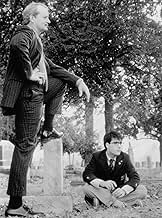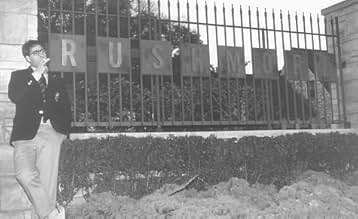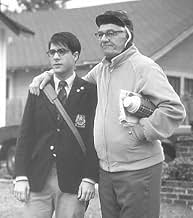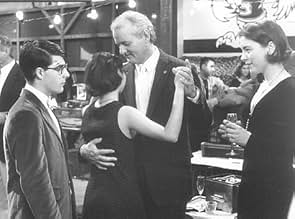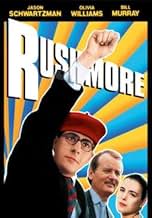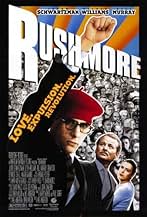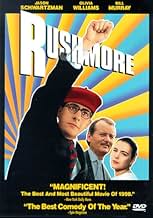Der König der Rushmore Preparatory School wird auf akademische Probe gestellt.Der König der Rushmore Preparatory School wird auf akademische Probe gestellt.Der König der Rushmore Preparatory School wird auf akademische Probe gestellt.
- Regie
- Drehbuch
- Hauptbesetzung
- Auszeichnungen
- 16 Gewinne & 16 Nominierungen insgesamt
Dipak Pallana
- Mr. Adams
- (as Deepak Pallana)
Empfohlene Bewertungen
Max Fischer (Jason Schwartzman) is an odd friendless teen at a private school with lots of useless extracurricular activities. He get put on academic probation, and falls obsessively in love with elementary teacher Miss Cross (Olivia Williams). He befriends an equally odd wealthy Herman Blume (Bill Murray), the owner of a pipe company. She dates Dr. Peter Flynn (Luke Wilson) which raises the ire of Max. Then Herman becomes infatuated with the lovely teacher and Max gets kicked out of private school.
These are truly uncompromisingly odd characters. They are a quirky unconventional group. They are not immediately hilarious but funny in how wacky Schwartzman gets. The dialog is sharp with a lot of unusual Wes Anderson takes. Bill Murray extends his range starting an acting relationship with Wes. It's a wonderful move forward for Wes and friends.
These are truly uncompromisingly odd characters. They are a quirky unconventional group. They are not immediately hilarious but funny in how wacky Schwartzman gets. The dialog is sharp with a lot of unusual Wes Anderson takes. Bill Murray extends his range starting an acting relationship with Wes. It's a wonderful move forward for Wes and friends.
As I watched this film, I couldn't help but find brief and twisted similarities between Max Fischer's school days and that of Edward Albee of 'Who's Afraid of Virgina Woofe' fame. Before you laugh let me explain:
Max recieved a scholarship for a play written in childhood, showed significant reluctance to follow the curriculum, and rather chose to pursue his own interests, especially play writing.
Edward Albee, in most of his biographical information, comments on his difficulities in school, and dropping out of college after about a year and a half, to focus on his writing. Further, Albee's work became recognized at the early age of thirteen when he wrote 'The Zoo Story'.
Max was not from the wealthy family as Albee was. Although, the greater than $10,000,000, Herman Blume, (dissatisfied with the conventional, insensitive , sterotypical jock, twins of his own) "abopts" Max as a surrogate son.
The father of Max was reminiscent of Thorton Wilder who encouraged Albee to follow his instincts and become a play write.
As we leave Max he has written his successful work 'Heaven & Hell', his stage production of 'Apocalypse Now'. At this point in time, this is Max's theatrical master piece, his 'Who's Afraid of Virgina Woolfe', if you will.
Also, don't forget the name of Miss Cook's deceased Edward Appleby...
Now, for those of you who have never been mistaken in reading the undertone of a movie, cast the first stone. I would welcome the comments. For those of you few that may agree, please let me know, possibly there are more correlations.
.
Max recieved a scholarship for a play written in childhood, showed significant reluctance to follow the curriculum, and rather chose to pursue his own interests, especially play writing.
Edward Albee, in most of his biographical information, comments on his difficulities in school, and dropping out of college after about a year and a half, to focus on his writing. Further, Albee's work became recognized at the early age of thirteen when he wrote 'The Zoo Story'.
Max was not from the wealthy family as Albee was. Although, the greater than $10,000,000, Herman Blume, (dissatisfied with the conventional, insensitive , sterotypical jock, twins of his own) "abopts" Max as a surrogate son.
The father of Max was reminiscent of Thorton Wilder who encouraged Albee to follow his instincts and become a play write.
As we leave Max he has written his successful work 'Heaven & Hell', his stage production of 'Apocalypse Now'. At this point in time, this is Max's theatrical master piece, his 'Who's Afraid of Virgina Woolfe', if you will.
Also, don't forget the name of Miss Cook's deceased Edward Appleby...
Now, for those of you who have never been mistaken in reading the undertone of a movie, cast the first stone. I would welcome the comments. For those of you few that may agree, please let me know, possibly there are more correlations.
.
One of the greatest films ever? I don't think that's an understatement, and I'm not just saying it cause I'm a Bill Murray fan and he happens to be in it. Granted, he brings to the movie his usual subtle quirkiness, but that humor isn't out of line with the general mood of the film. The whole thing is seriously funny and somehow seriously real, but at the same time doesn't always take itself seriously. Seriously. The idea of the movie doesn't come off sounding like a very captivating plot: high school geek and middle-aged millionaire fall in love with the same first grade teacher. Not exactly material for a high-grossing box office hit. But I don't think plot necessarily matters when it comes to making a quality film. It has a fantastic script, believable character development, and top-notch acting, and that's what counts in making a memorable film. Why do we love Rushmore? Max and Mr. Blume are the same person, Mr. Blume is just older and wealthier. They are both creative, romantic characters whose motives are ultimately selfish. My guess is if you appreciate this film, it's probably because you're the same way. This movie is about us. We are the boys who do everything we want to and nothing we're supposed to. The ones who go to college and get by on as little effort as possible, but somehow still pull through. At one point or another we all believed we could make our fantasies a reality, and watching this film makes us optimistic about those things again.
Also, I don't think a soundtrack makes a film, but it can certainly help set the mood. Yes, I have to agree with the other commenters for Rushmore: great soundtrack. But you already know that and it's been said a hundred times, so I think I'll just leave it at that and not beat it into the ground any more than it already has.
Right. Good movie, watch it if you haven't yet.
Also, I don't think a soundtrack makes a film, but it can certainly help set the mood. Yes, I have to agree with the other commenters for Rushmore: great soundtrack. But you already know that and it's been said a hundred times, so I think I'll just leave it at that and not beat it into the ground any more than it already has.
Right. Good movie, watch it if you haven't yet.
Rushmore was the first Wes Anderson film I saw, and I didn't think much of it the first time. I used to think that Royal Tenenbaums was Anderson's first good film. I thought Bottle Rocket wore its rookie status on its sleeve; I thought Rushmore was flawed; and I thought Tenenbaums finally showed that Anderson had honed his craft and he would start making great films. I then re-watched Tenenbaums and found it to be even more satisfying on additional viewings. I realized that Anderson had actually crafted one of those rare pieces of cinema that reveals itself more and more upon repeat viewings. So I of course decided to give Rushmore a second look.
Now that I've had a chance to see the DVD, I've had a much different experience viewing the film. Perhaps because I saw it on Pan and Scan VHS previously? Or perhaps because Anderson's vision requires an adjustment period?
Some people will never like Anderson's films. They simply will not appeal to those out there who want clichéd Hollywood fodder. Some people will love Anderson's films from the moment they see them. Others, like myself, will need to see the films more than once to truly appreciate them. Anderson breaks convention in ways no one has done before - One has to understand that his films are deep where most films are shallow, and shallow where most films are deep. This will throw A LOT of people off, as evidenced by many of the comments on the message boards. Anderson's films begin where others end. In Rushmore, we see Max's fall from grace, not his climb up to become head of every club in his school. In Tenenbaums, we see the aftermath of the child prodigies, not their glory years. Again, this will throw a lot of people off, and indeed I heard this criticism of Tenenbaums quite a lot. Anderson constructs the world of his films around a cinema storybook. They are episodic, told in chapters. Some will find Anderson at first glance to be a rather egotistical filmmaker, as I once did. However, upon second glance, you can begin to see the rich text woven deeper in the films that might be hidden beneath quirkiness or drastic breaks from convention. The first time I saw Rushmore, I felt shock, embarrassment and confusion (Mostly at Max and Rosemary's bizarre interaction). I was lost and unfamiliar with this world Anderson has created. The second time I saw the film I felt Passion, Love, Tragedy and ultimate Redemption. I found the heart in Anderson's film.
If you felt Rushmore was not all it could have been the first time you saw it, please give it another chance. You'll find which side you fall on.
Now that I've had a chance to see the DVD, I've had a much different experience viewing the film. Perhaps because I saw it on Pan and Scan VHS previously? Or perhaps because Anderson's vision requires an adjustment period?
Some people will never like Anderson's films. They simply will not appeal to those out there who want clichéd Hollywood fodder. Some people will love Anderson's films from the moment they see them. Others, like myself, will need to see the films more than once to truly appreciate them. Anderson breaks convention in ways no one has done before - One has to understand that his films are deep where most films are shallow, and shallow where most films are deep. This will throw A LOT of people off, as evidenced by many of the comments on the message boards. Anderson's films begin where others end. In Rushmore, we see Max's fall from grace, not his climb up to become head of every club in his school. In Tenenbaums, we see the aftermath of the child prodigies, not their glory years. Again, this will throw a lot of people off, and indeed I heard this criticism of Tenenbaums quite a lot. Anderson constructs the world of his films around a cinema storybook. They are episodic, told in chapters. Some will find Anderson at first glance to be a rather egotistical filmmaker, as I once did. However, upon second glance, you can begin to see the rich text woven deeper in the films that might be hidden beneath quirkiness or drastic breaks from convention. The first time I saw Rushmore, I felt shock, embarrassment and confusion (Mostly at Max and Rosemary's bizarre interaction). I was lost and unfamiliar with this world Anderson has created. The second time I saw the film I felt Passion, Love, Tragedy and ultimate Redemption. I found the heart in Anderson's film.
If you felt Rushmore was not all it could have been the first time you saw it, please give it another chance. You'll find which side you fall on.
Very rarely can a director evoke so much awkwardness and kindness from his/her silent moments in their films. Wes Anderson is one filmmaker who can. His characters are so richly drawn, finely acted and beautifully directed, that even when they're not speaking... we can read their emotions, we feel their pain. Young Jason Swartzman gives a fantastic performance. Even nicer is the surprise turn by Bill Murray, who manages to play a good guy and a villain at the same time. In one scene he is wearing Budweiser boxer shorts on a diving board. He is smoking a cigarette and jumps, doing a cannonball into his sewer-ridden pool. We see him curled up at the bottom of his pool, drowning himself in misery. Is this a connection to his future lover's dead husband? Who knows. But what we do know is that Anderson has crafted his film to star the most unlikely of heroes. They are the oddest of the bunch, but at the same time we know what they are going through. Their oddness aside, what we learn to see more of, is their hearts. It is obvious Anderson has wiped his heart all over this piece, and it pays off more than I'm sure he ever could have imagined.
Wes Anderson Films as Ranked by IMDb Rating
Wusstest du schon
- WissenswertesJason Schwartzman came to his audition wearing a prep-school blazer which sported a Rushmore patch he had made himself.
- PatzerThe Swiss Army Knife Dirk gives Max says "Rushmore Yankee 1985-1997". Since Max is 15, this would mean he has gone to Rushmore since age three. But his first talk with Dr. Guggenheim reveals that he has only gone to Rushmore since second grade.
- Zitate
Max Fischer: I like your nurse's uniform, guy.
Dr. Peter Flynn: These are O.R. scrubs.
Max Fischer: O, R they?
- VerbindungenFeatured in The 56th Annual Golden Globe Awards (1999)
- SoundtracksMaking Time
Written by Eddie Phillips (as Edwin Michael Phillips) and Kenneth George Pickett
Published by EMI Unart Catalog Inc. (BMI)
Performed by The Creation
Courtesy of Shel Talmy Productions
Top-Auswahl
Melde dich zum Bewerten an und greife auf die Watchlist für personalisierte Empfehlungen zu.
24 Frames From Wes Anderson Films
24 Frames From Wes Anderson Films
Explore the memorable career of Wes Anderson through 24 stills from his movies.
- How long is Rushmore?Powered by Alexa
Details
- Erscheinungsdatum
- Herkunftsland
- Sprachen
- Auch bekannt als
- Tres son multitud
- Drehorte
- Produktionsfirmen
- Weitere beteiligte Unternehmen bei IMDbPro anzeigen
Box Office
- Budget
- 9.000.000 $ (geschätzt)
- Bruttoertrag in den USA und Kanada
- 17.105.219 $
- Eröffnungswochenende in den USA und in Kanada
- 43.666 $
- 13. Dez. 1998
- Weltweiter Bruttoertrag
- 17.198.495 $
- Laufzeit
- 1 Std. 33 Min.(93 min)
- Sound-Mix
- Seitenverhältnis
- 2.39 : 1
Zu dieser Seite beitragen
Bearbeitung vorschlagen oder fehlenden Inhalt hinzufügen



